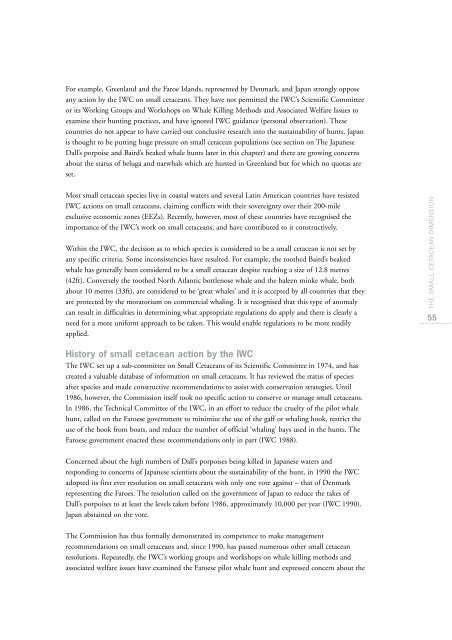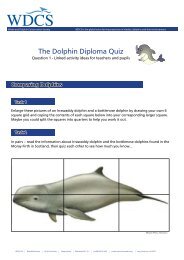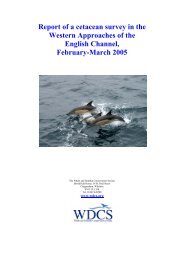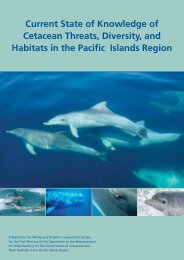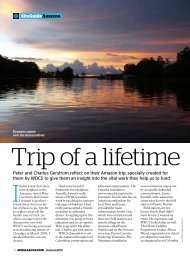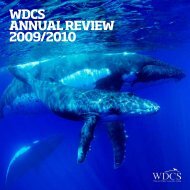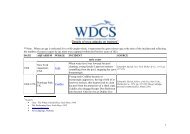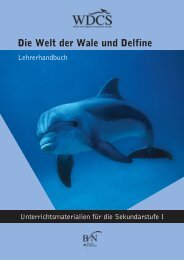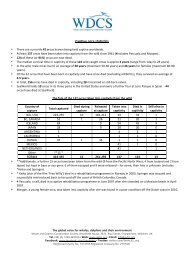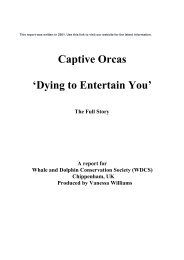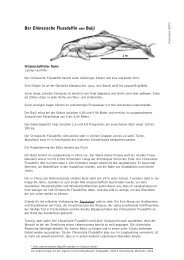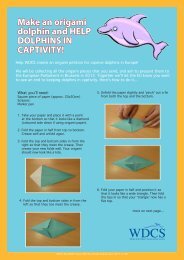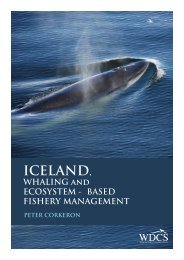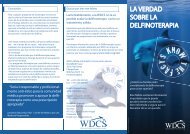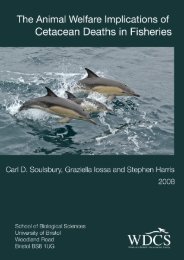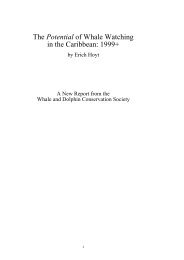TROUBLED WATERS - Whale and Dolphin Conservation Society
TROUBLED WATERS - Whale and Dolphin Conservation Society
TROUBLED WATERS - Whale and Dolphin Conservation Society
You also want an ePaper? Increase the reach of your titles
YUMPU automatically turns print PDFs into web optimized ePapers that Google loves.
For example, Greenl<strong>and</strong> <strong>and</strong> the Faroe Isl<strong>and</strong>s, represented by Denmark, <strong>and</strong> Japan strongly oppose<br />
any action by the IWC on small cetaceans. They have not permitted the IWC’s Scientific Committee<br />
or its Working Groups <strong>and</strong> Workshops on <strong>Whale</strong> Killing Methods <strong>and</strong> Associated Welfare Issues to<br />
examine their hunting practices, <strong>and</strong> have ignored IWC guidance (personal observation). These<br />
countries do not appear to have carried out conclusive research into the sustainability of hunts. Japan<br />
is thought to be putting huge pressure on small cetacean populations (see section on The Japanese<br />
Dall’s porpoise <strong>and</strong> Baird’s beaked whale hunts later in this chapter) <strong>and</strong> there are growing concerns<br />
about the status of beluga <strong>and</strong> narwhals which are hunted in Greenl<strong>and</strong> but for which no quotas are<br />
set.<br />
Most small cetacean species live in coastal waters <strong>and</strong> several Latin American countries have resisted<br />
IWC actions on small cetaceans, claiming conflicts with their sovereignty over their 200-mile<br />
exclusive economic zones (EEZs). Recently, however, most of these countries have recognised the<br />
importance of the IWC’s work on small cetaceans, <strong>and</strong> have contributed to it constructively.<br />
Within the IWC, the decision as to which species is considered to be a small cetacean is not set by<br />
any specific criteria. Some inconsistencies have resulted. For example, the toothed Baird’s beaked<br />
whale has generally been considered to be a small cetacean despite reaching a size of 12.8 metres<br />
(42ft). Conversely the toothed North Atlantic bottlenose whale <strong>and</strong> the baleen minke whale, both<br />
about 10 metres (33ft), are considered to be ‘great whales’ <strong>and</strong> it is accepted by all countries that they<br />
are protected by the moratorium on commercial whaling. It is recognised that this type of anomaly<br />
can result in difficulties in determining what appropriate regulations do apply <strong>and</strong> there is clearly a<br />
need for a more uniform approach to be taken. This would enable regulations to be more readily<br />
applied.<br />
History of small cetacean action by the IWC<br />
The IWC set up a sub-committee on Small Cetaceans of its Scientific Committee in 1974, <strong>and</strong> has<br />
created a valuable database of information on small cetaceans. It has reviewed the status of species<br />
after species <strong>and</strong> made constructive recommendations to assist with conservation strategies. Until<br />
1986, however, the Commission itself took no specific action to conserve or manage small cetaceans.<br />
In 1986, the Technical Committee of the IWC, in an effort to reduce the cruelty of the pilot whale<br />
hunt, called on the Faroese government to minimize the use of the gaff or whaling hook, restrict the<br />
use of the hook from boats, <strong>and</strong> reduce the number of official ‘whaling’ bays used in the hunts. The<br />
Faroese government enacted these recommendations only in part (IWC 1988).<br />
Concerned about the high numbers of Dall’s porpoises being killed in Japanese waters <strong>and</strong><br />
responding to concerns of Japanese scientists about the sustainability of the hunt, in 1990 the IWC<br />
adopted its first ever resolution on small cetaceans with only one vote against – that of Denmark<br />
representing the Faroes. The resolution called on the government of Japan to reduce the takes of<br />
Dall’s porpoises to at least the levels taken before 1986, approximately 10,000 per year (IWC 1990).<br />
Japan abstained on the vote.<br />
The Commission has thus formally demonstrated its competence to make management<br />
recommendations on small cetaceans <strong>and</strong>, since 1990, has passed numerous other small cetacean<br />
resolutions. Repeatedly, the IWC’s working groups <strong>and</strong> workshops on whale killing methods <strong>and</strong><br />
associated welfare issues have examined the Faroese pilot whale hunt <strong>and</strong> expressed concern about the<br />
THE SMALL CETACEAN DIMENSION<br />
55


